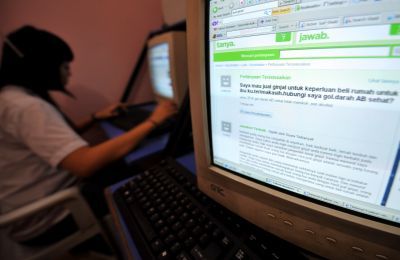Desperate Indonesians sell organs online

Cash-strapped Indonesians are cutting out the middleman and selling their organs online, exploiting a loophole in local laws and fueling a dangerous and illegal trade in human body parts.
Hundreds of advertisements have appeared on Indonesian personal advertising websites offering kidneys for as little as 50 million rupiah (5,300 dollars) each.
Among the usual cars, jewellery and beauty products, one advertisement on www.iklanoke.com states: "16-year-old male selling a kidney for 350 million rupiah or in exchange for a Toyota Camry."
Many of the advertisers - students, professionals and even housewives - are not shy about using their real names or leaving their contact numbers.
Most insist they are disease-free and do not smoke, consume alcohol or take drugs.
Family debts and outstanding bank loans are driving them to desperate measures, they say.
Eighteen-year-old high-school student Elisa said her family had debts worth tens of thousands of dollars after a fire razed their home in Jakarta and her father's grocery store failed.
"We now live at my grandmother's house. My mother works as a cook and my father helps out at an uncle's grocery store, but their earnings are only enough to buy food," Elisa told AFP by phone.
"I owe my school six months in fees. I often cry thinking about our fate. A movie I saw said selling kidneys is a quick way to get loads of cash. I want to sell mine so I can buy a new house and pay my school fees," said the eldest of four siblings.
She rejected two Indonesian buyers who couldn't meet her asking price of 800 million rupiah, she said.
Interested local and foreigner buyers are willing to pay up to 200 million rupiah for a kidney, sellers say.
Another seller, 22-year-old graphic designer Andi, said a European and a Chinese have separately offered to buy his kidney for 200 million rupiah - four times his asking price.
"They wanted to see a health report from a doctor and asked if I would go overseas for transplant. After a few emails, I never heard from them again," he said.
Andi said he wanted to repay his elderly foster parents for "looking after me like their own", he said.
Organ trading is outlawed in Indonesia and carries a penalty of up to 15 years' jail and a 300-million-rupiah fine.
Officials however admit that sellers get away with it because websites such as iklanoke go largely unmonitored and the law is vague and difficult to enforce.
"The health law states that organ transplants can only be carried out for humanitarian purposes but it doesn't define the meaning of humanitarian," Indonesia Interpol department chief Anas Yusuf said.
"So it's hard to prove if a transplant is carried out for humanitarian or commercial reasons."
He said Interpol was aware of cases of organ trading in Indonesia, although government officials contacted by AFP said they had no data on the size of the illegal market.
"Negotiations between sellers and buyers are carried out in private so unless they're reported, we won't know. Also, transplants are usually carried out overseas so it's hard to prosecute offenders," Yusuf said.
Two Indonesian men were jailed and fined in Singapore in July 2008 for their involvement in the organ trade. The judge said that while they had agreed to sell their kidneys, syndicates had exploited their disadvantaged backgrounds.
General practitioner and lawmaker Subagyo Partodiharjo said much of the grisly trade was controlled by an "organ mafia" which approached poor people in remote villages in Java.
"I suspect it could be them posting the advertisements on behalf of the sellers," Partodiharjo said.
Public education on the risks of organ transplants and stricter monitoring of the Internet could help reduce the illegal trade, lawmakers said.
"The poor are usually ignorant of the health risks involved and are tempted by the money. Local governments need to inform people not to resort to selling organs to get money," Partodiharjo said.
Twenty-six-year-old telecommunications officer Jhon, who is offering to sell his kidney, liver and cornea, said desperate people would do anything to pull their families out of debt.
"I know about the law, I know about the health risks. Nobody wants to lose a body part and become a handicapped," he said.
"It's a last resort. If I can't earn enough to pay off my family's debt by December, I have no choice. For them, I'm willing to give up everything... my kidneys, my heart, my eyes, even my life," he said.
by Arlina Arshad
aa/smc/lb/km
Subscribe to Independent Premium to bookmark this article
Want to bookmark your favourite articles and stories to read or reference later? Start your Independent Premium subscription today.

Join our commenting forum
Join thought-provoking conversations, follow other Independent readers and see their replies